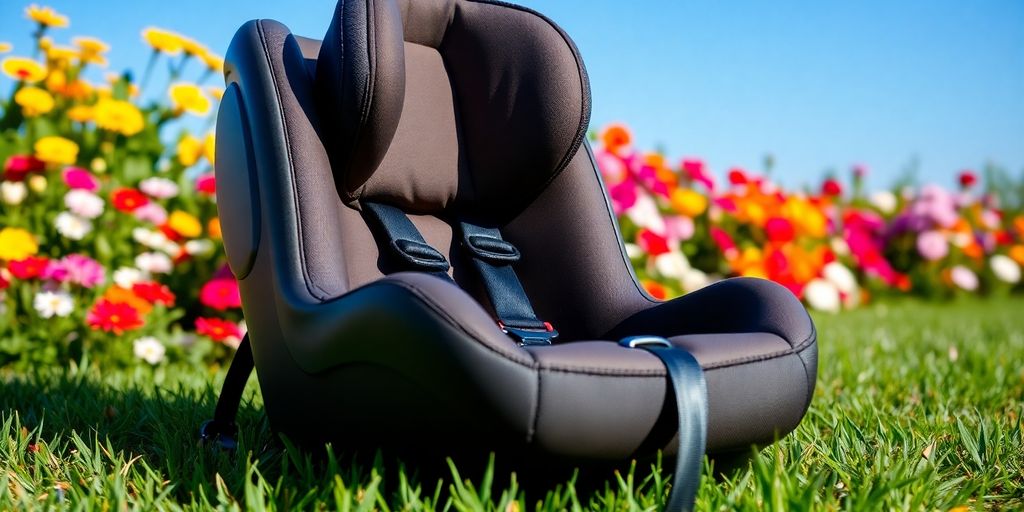If you have an old car seat lying around and you’re not sure what to do with it, this guide is here to help. Recycling or donating your used car seat is a great way to keep it out of landfills while also helping others. From national trade-in events to local recycling programs, there are plenty of options available. Here’s a look at some key takeaways to make your search easier.
- Discover the Most Popular Restaurants Near Me: A Local’s Guide to Dining in San Diego
- Discovering the Best Good Family Restaurants Near Me: A Guide to Memorable Dining Experiences
- Discover the Best Buffet Near Me with Price: A Comprehensive Guide to Affordable Dining Options
- Discover the Top Famous South Indian Restaurants Near Me for an Authentic Culinary Experience
- Who Buys Pokemon Cards Near Me? Discover Local Buyers and Best Selling Options!
Key Takeaways
- Check the expiration date and condition of your car seat before recycling or donating it.
- National retailers like Target and Walmart often have trade-in events for car seats, offering discounts on new purchases.
- Consider donating usable car seats to shelters, local charities, or child safety organizations.
- If recycling, make sure to dismantle the car seat and separate materials as needed.
- Use online resources and local community groups to find recycling options in your area.
National Retailer Trade-In Events
Target Car Seat Trade-In Program
Target runs a car seat trade-in program twice a year, allowing customers to exchange old, expired, or damaged car seats for a coupon. The next event is scheduled from September 15 to September 28, 2024. This initiative not only helps you get rid of an old car seat but also provides a discount on a new one.
You are viewing: Where to Donate Used Car Seats Near Me: A Comprehensive Guide to Local Options
Walmart Car Seat Recycling Events
Walmart also hosts car seat recycling events, where you can drop off your old car seats. These events are typically announced in advance, so keep an eye on local advertisements or Walmart’s website for details.
Other Retailer Initiatives
Many other retailers may have similar programs. Here are a few to consider:
- Buy Buy Baby: Often has trade-in events.
- Kohl’s: Occasionally offers recycling options.
- Local Baby Stores: Check with nearby stores for any special initiatives.
Participating in these trade-in events is a great way to ensure your old car seat is recycled properly while also saving money on a new purchase!
Local Recycling Programs and Centers
Municipal Waste Management Services
Many cities have specific waste management services that accept used car seats for recycling. These services often organize special collection events or have designated drop-off locations. To find out if your city offers such programs, check your local waste management authority’s website or give them a call.
Dedicated Resource Recovery Stations
Some areas feature resource recovery stations that focus on recycling various materials, including car seats. These stations are equipped to handle the unique components of car seats, ensuring they are processed correctly. Here’s a quick list of what to look for:
- Check for local recovery stations in your area.
- Confirm if they accept car seats.
- Inquire about any specific drop-off times or requirements.
Curbside Collection Events
Occasionally, municipalities host curbside collection events where residents can leave out their used car seats for pickup. This is a convenient option, but it’s essential to verify the schedule and guidelines. Here’s how to prepare:
- Check the event dates with your local waste management.
- Securely place the car seat outside on the designated day.
- Follow any specific instructions provided by the waste management service.
Remember, recycling your old car seat is not just about getting rid of it; it’s about ensuring it’s disposed of in an environmentally friendly way. To recycle your old car seat, please bring it to one of the drop-off locations listed below. There is no cost to recycle your car seat. City, phone number …
Specialized Car Seat Recycling Centers
Earth911 Recycling Locator
One of the best tools to find recycling drop-off locations is the Earth911 Recycling Locator. This online resource helps you locate nearby facilities that accept car seats. Simply enter your zip code and the type of item you want to recycle to get started.
TerraCycle Mail-In Program
TerraCycle offers a mail-in program specifically for car seats. This option is great if you can’t find local recycling centers. You can send your car seat to them, and they will ensure it is recycled properly. They often provide detailed instructions on how to prepare your car seat for shipping.
BabyEarth RENEW Program
The BabyEarth RENEW program focuses on recycling car seats and other baby gear. They accept used car seats and work to recycle as many components as possible. This program is a fantastic way to ensure that your old car seat is disposed of in an environmentally friendly manner.
Remember, recycling your car seat not only helps the environment but also keeps materials out of landfills. Check local options to find the best solution for your needs!
Donation Options for Used Car Seats
When it comes to donating used car seats, there are several options to consider. Many organizations are eager to help families in need. Here are some places where you can donate your old car seat:
Women’s Shelters and Local Charities
- Many women’s shelters and local charities often need car seats for families in crisis.
- These organizations provide essential resources to those who may not have the means to purchase a new car seat.
- Be sure to check the condition of your car seat before donating.
Church Organizations
- Local churches frequently run programs to assist families in need.
- Some may have specific ministries that distribute car seats to those who cannot afford them.
- Contact your local church to see if they accept donations of car seats.
Child Passenger Safety Technicians (CPSTs)
- CPSTs are trained professionals who focus on car seat safety.
- They may accept used car seats for educational purposes or demonstrations.
- Reach out to a CPST in your area to see if they would like your old seat.
Donating your used car seat can make a significant difference in someone’s life. Always be honest about the condition of the seat to ensure safety for the next user.
By considering these options, you can help ensure that your used car seat finds a new home where it can be put to good use. Remember, safety is the top priority when donating car seats, so always check their condition before passing them on.
DIY Dismantling and Recycling
When you need to dispose of an old car seat, dismantling it yourself can be a great option. Here’s how to do it safely and responsibly:
Steps to Disassemble a Car Seat
- Remove the Fabric Cover: Start by cutting away the fabric cover. If it’s still in good shape, think about donating or repurposing it.
- Detach the Harness and Buckles: Use scissors to cut off the straps and unscrew or untie any buckles.
- Unscrew and Separate Plastic Parts: Most plastic and metal parts can be separated by unscrewing them. Check for recycling codes on the plastics to ensure proper disposal.
- Mark as Unusable: If any part of the car seat remains, label it with "DO NOT USE" to prevent accidental reuse.
Recycling Plastic and Metal Components
| Material Type | Recycling Code | Disposal Method |
|---|---|---|
| Plastic | 1-7 | Local recycling center |
| Metal | N/A | Scrap metal facility |


Local Guidelines for Recycling Materials
- Always check with your local waste management for specific recycling rules.
- Some areas may have special drop-off locations for car seat materials.
- Ensure you follow safety guidelines when handling sharp objects.
Dismantling your car seat not only helps the environment but also ensures that it doesn’t end up in a landfill. By recycling, you contribute to a more sustainable future.
By following these steps, you can effectively recycle your old car seat and help reduce waste in your community. Remember, every small action counts!
Manufacturer Take-Back Programs
Checking Manufacturer Websites
Many car seat manufacturers have recycling programs to help you dispose of old car seats safely. Start by checking the manufacturer’s website or calling their customer service. They often provide pre-paid shipping labels, making it easy to send your old car seat back to them. This way, they can dismantle and recycle parts like the plastic shell and metal buckles, which helps reduce waste.
Pre-Paid Shipping Labels
Read More : Who Buys Wheelchairs Near Me: Finding Local Buyers for Your Mobility Equipment
Some companies offer pre-paid shipping labels for returning used car seats. This means you won’t have to pay for shipping, making it a cost-effective option. Here’s a quick list of steps to follow:
- Visit the manufacturer’s website.
- Look for their recycling program details.
- Request a shipping label if available.
Recycling Process by Manufacturers
When you send your car seat back, manufacturers usually recycle it in a few steps:
- Dismantling: They take apart the car seat into its components.
- Sorting: Different materials like plastic and metal are sorted.
- Recycling: The materials are then processed and recycled into new products.
Remember, recycling your car seat not only helps the environment but also ensures that it is disposed of safely and responsibly. Participating in these programs is a great way to contribute to sustainability efforts.
Community and Online Resources
Local Parenting Groups
- Join local parenting groups on platforms like Facebook to connect with other parents. These groups often share information about car seat donations and recycling options.
- Look for community events where parents gather; these can be great places to exchange items like car seats.
- Many groups have specific threads for giving away or trading baby items, including car seats.
Social Media Platforms
- Use hashtags like #CarSeatDonation or #BabyGearExchange on Instagram and Twitter to find local opportunities.
- Facebook Marketplace can be a useful tool for finding nearby families looking for car seats or offering them for free.
- Follow local charities and organizations on social media to stay updated on their needs and donation drives.
Online Forums and Bulletin Boards
- Websites like Nextdoor can help you connect with neighbors who might need a car seat or know where to donate one.
- Check out parenting forums where members often discuss local resources for donating baby gear.
- Utilize bulletin boards at community centers or libraries to post about available car seats or inquire about donation options.
Connecting with your community can make a big difference. Local resources often have the most immediate needs and can help you find the best options for donating your used car seat.
Final Thoughts on Car Seat Recycling
In conclusion, recycling your old car seat is a smart choice that helps both the environment and your community. By knowing where to donate or recycle, you can make sure that these important items are disposed of safely and responsibly. Whether you choose to participate in trade-in events at stores like Target, check with local charities, or use specialized recycling centers, every effort counts. Remember to always check the condition and expiration date of your car seat before deciding what to do with it. By taking these steps, you’re not just clearing out space in your home; you’re also contributing to a healthier planet for everyone.
Frequently Asked Questions
What should I do if my car seat is expired?
If your car seat is expired, it’s best to recycle it. Check local recycling programs or manufacturer take-back options.
Can I donate a used car seat?
Yes, you can donate a used car seat, but only if it’s in good condition and not expired. Many shelters and charities accept them.
How do I find local recycling programs for car seats?
Look up your city’s waste management website or search online for terms like ‘car seat recycling near me’ to find local options.
What happens to car seats when I recycle them?
Recycled car seats are often broken down into materials like plastic and metal, which can be used to make new products.
Are there trade-in events for car seats?
Yes, retailers like Target and Walmart often have trade-in events where you can exchange your old car seat for discounts on new ones.
Is it safe to use a second-hand car seat?
Using a second-hand car seat is not recommended unless you know its history, including whether it has been in an accident or is expired.
Soure: https://herego.net
Category: near me


